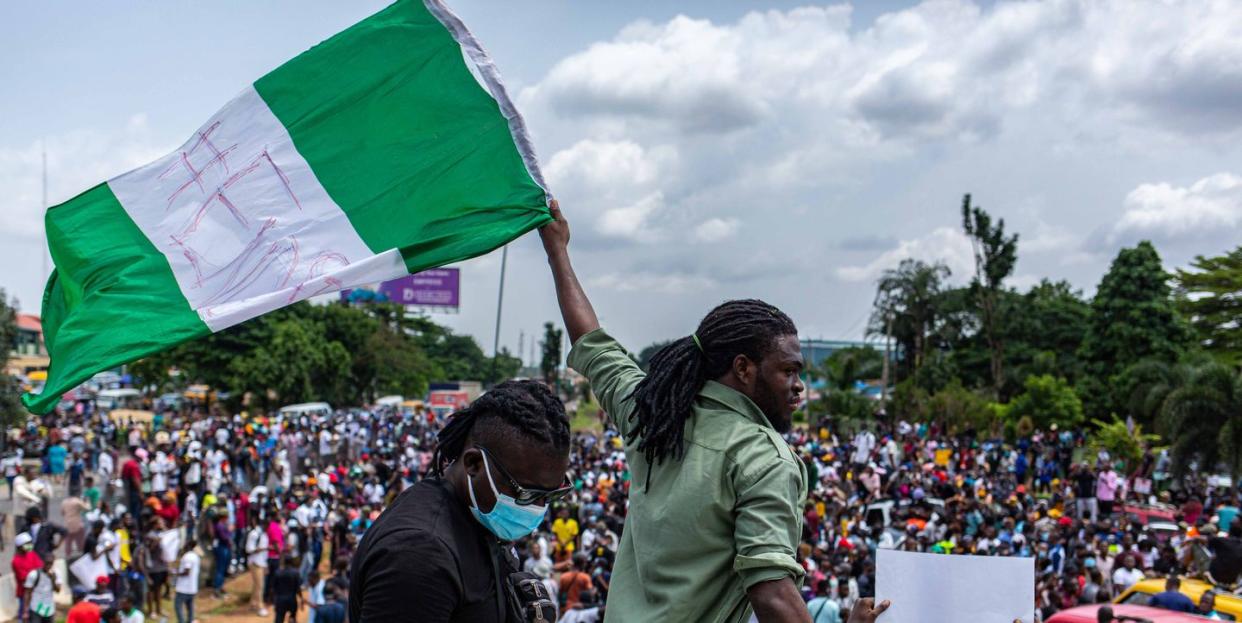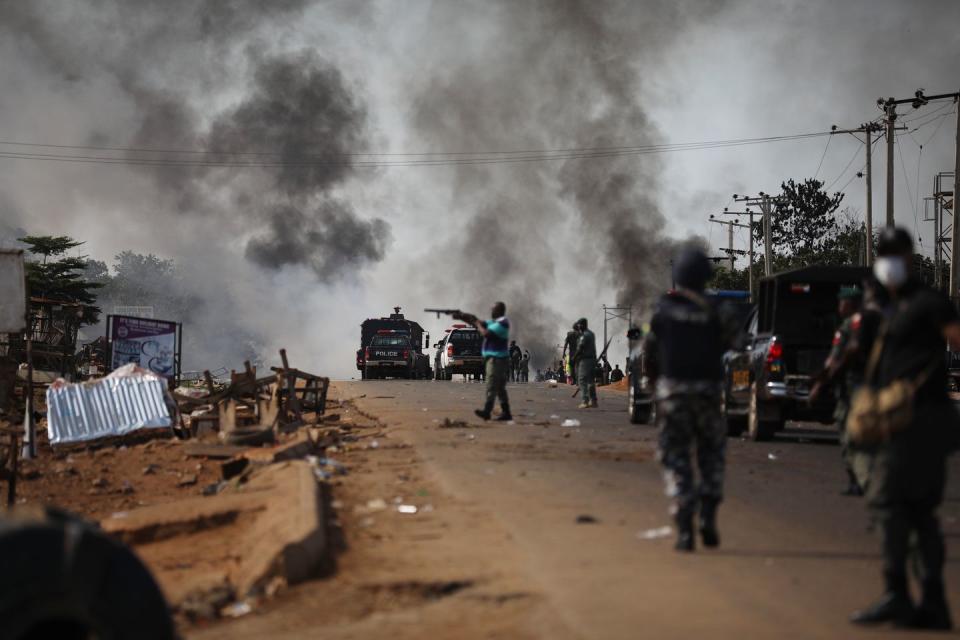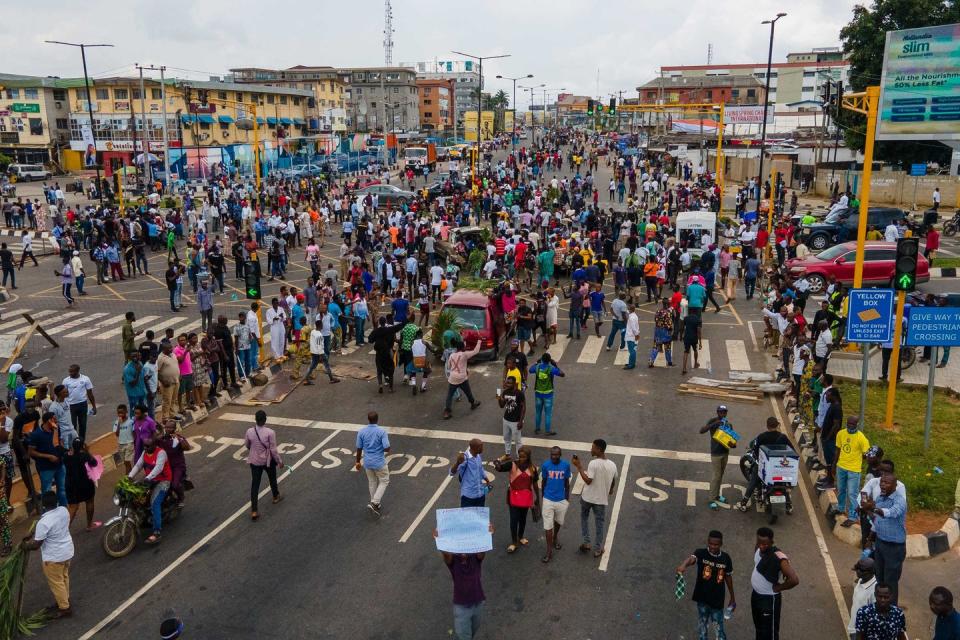The #EndSars movement: what you need to know

Few of us could have missed the headlines about the nationwide protests calling to end police brutality in Nigeria. But what's really going and why? Historically, police forces in Nigeria have unlawfully killed thousands of the nation’s citizens, facing few or no repercussions. In 1992, The Special Anti-Robbery Squad (SARS) was formed to eradicate armed robberies, kidnappings and further crimes. Protests began on 8 October after a video went viral showing an officer thought to be from SARS allegedly killing a man in the southern Delta state.
Promises to reform the system have been made, but campaigners say that it's not enough. Some expressed their anger on social media using the hashtag #EndSARS, and the youth championed a liberation movement by protesting on the streets, vowing not to hold back until meaningful change was made. “The youth took the fight into their hands,” young activist Camille Shaiyen told us. “We stepped into the streets and protested peacefully for 12 days until the government shut it down. We have trended online, made demands to the government and written online petitions. The underestimated youth made the country stand still for nearly two weeks, with our brothers and sisters all around the world joining us to march against police brutality and injustice. "Now that the government is allegedly trying to incite violence in order to control the narrative and claim that the protesters are rowdy and violent, we have taken the fight online.”
In light of the social disruptions in Nigeria, it's imperative to acknowledge this important movement, find out what's happening and how to help.
SO, WHAT IS SARS AND HOW DID IT BEGIN?
The Nigerian police was first established back in 1820, but it was only over 100 years later in 1930 that northern and southern police merged into the very first national patrol powers, called the Nigeria Police Force. 1992 saw the formation of SARS to grapple against serious crimes across the country. Although crime-prevention had always been part of the Nigerian police agenda, from 1984 anti-robbery units existed separately as part of different state departments of justice. For a decade, SARS only operated in Lagos, but in 2002, it spread across the nation’s 36 states of the federation as well as the Federal Capital Territory, Abuja. Officers bolstered their powers into social acts of brutality, extorting money from innocent citizens and implementing abuses, tortures and illicit actions. The New York Times reports that “the government said it would bow to the demands of Nigerians protesting police abuses, but skeptical protesters vowed to keep the pressure on.”

WHY ARE PEOPLE PROTESTING AND WHAT DO THEY WANT TO ACHIEVE?
After a video of a man being killed in Delta state allegedly by SARS began to widely circulate on social media (the authorities denied it was real), thousands of young protesters marched in cities across Nigeria with banners remarking: “#EndSARS.” The witness who filmed the clip was arrested, inciting even more angst among society. The federal government responded by pledging it would ban the Anti-Robbery squad on 11 October. However, protestors were unsatisfied with the announcement, wanting to achieve a greater level of social impartiality and demanding an end to human abuses and respect for human rights in all parts of the Nigerian police force.
The issue in Nigeria was exacerbated when on Sunday 11 October, President Muhammadu Buhari announced SARS had been “dissolved with immediate effect”. Protestors demanded further law enforcements such as accountability for former SARS members.
A number of celebrities including Beyoncé have also spoken out in favour of the #EndSARS movement. A statement from the singer on the Instagram feed read: "I am heartbroken to see the senseless brutality taking place in Nigeria. There has be to be an end to SARS […] To our Nigerian sisters and brothers, we stand with you.”

HOW CAN PEOPLE HELP IN THE UK?
1.Partake in a protest (albeit at a social distance)
Protests will hit Britain starting from this weekend in London and across the country. Find out more at @endsarsuk , ensure social distancing measures and keep safe.
2. Write to your MP
Find out who your local MP is and send them a letter via the Write To Them website, urging them to condemn the brutality of Nigeria’s radical unrest.
3. Follow commendable sources
A crucial aspect to note from a socio-political movement is the level of progression that thrives from it. Amplifying a message is important, but if done judiciously it can result more effective. Here’s the Global Citizen site to give you an insightful overview and updates on all major occurrences happening in the country.
4. Sign petitions
If you don't want to join protests for pandemic-related reasons, signing petitions like this one, which asks the UK government to implement sanctions on Nigeria’s violence, can be a great way to be an ally and show support.
Plus, sign up here to get Harper’s Bazaar magazine delivered straight to your door.
You Might Also Like


